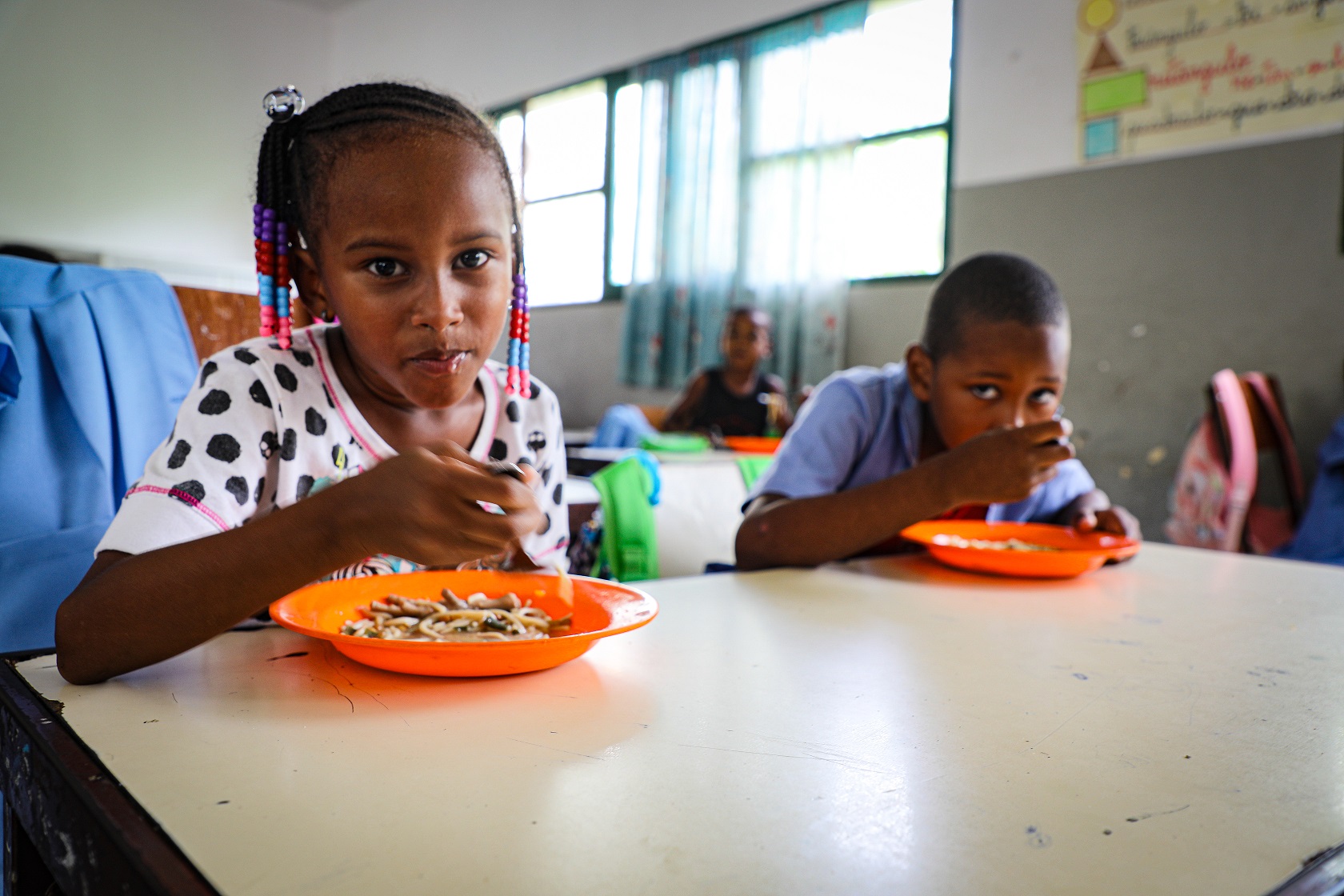
Photo: WFP/Richard Mbouet
Experts and representatives of the governments of Angola, Brazil, Cape Verde, Guinea Bissau, Mozambique, São Tomé and Príncipe and Timor-Leste attended the second technical meeting on school feeding in Portuguese-speaking countries on Tuesday, November 8. This time, the agenda focused on the importance of family farming purchases for the preparation of school meals, an initiative that is in distinct stages of implementation in the countries participating in the event.
The webinar was presented and organized by the WFP Centre of Excellence against Hunger in Brazil and also brought together UN agencies, researchers and third-sector organizations to share knowledge, support the development of strategies to re-establish and improve school feeding programmes and discuss best practices in South-South Trilateral Cooperation. Daniel Balaban, Director of the Centre of Excellence, stressed that the institution has been collaborating with the exchange of experiences between countries to improve its school feeding programmes since its opening 11 years ago.
“Home-grown school feeding has multiple benefits by connecting family farmers to local markets and generating income, reducing food imports and allowing organic food to be included in short production chains,” said Daniel Balaban. “Despite so many advances, we still have some challenges that persist. We need to ensure the financial sustainability of home-grown school feeding programmes and improve the variety, quality, storage and transportation of these products,” he added.
The event was divided into three moments: innovations, challenges and next steps in strengthening home-grown school feeding. Among the innovations mentioned by the participating countries are decrees regulating purchases of family-farming products with minimum percentages for these products, creation of community gardens, efforts to increase the variety and quality of purchased foods and use of new technologies for payments and menu creation. Isabella Araujo, Head of the Family Farming Development Division of the Brazilian National Fund for Education Development (FNDE), also mentioned the use of information materials regarding healthy eating in schoolbooks as another example of innovation in the country.
In Mozambique, the government has adapted public procurement tools to facilitate family farmers’ access to these markets. São Tomé and Príncipe has invested in community gardens and the project already reaches more than 30 schools, benefiting more than 20,000 students. A similar project is being implemented in Timor-Leste, with vegetable gardens in five schools supported by WFP. Additionally, Angola is developing an online menu platform to generate more efficiency and allow the elaboration of nutritious menus taking local specificities into account.
In the second part of the event, participants highlighted some challenges faced by countries. In Brazil, some of the current challenges are to encourage states and municipalities to use a specific and less bureaucratic instrument for the purchase of local food, and to ensure the dissemination of information on health inspection for products purchased for schools. In Cape Verde, a country that relies heavily on food imports, one of the biggest challenges is to meet the nutritional needs of students and mobilize resources to expand the school feeding programme.
Other challenges mentioned by countries include the high cost of local food compared to imported foods, electronic payment to family farmers, registration and legalization of these farmers, and the sale of processed food within or near schools.
In the last part of the session, countries shared the next steps for school feeding programmes. In Brazil, next actions include improving the dissemination of information on sanitary inspections, expanding the purchase of family farming products so that all states and municipalities meet a minimum of 30% of family farming products and the expansion of the purchase of organic products. Manuel Fulede, from the Ministry of Education in Mozambique, stressed that the country will finalize a food and nutrition education manual to be distributed in schools, expand the garden project and complete the school feeding strategy, including training for cooks.
Community involvement in school feeding activities was also a common goal pointed out by countries, especially Guinea Bissau, São Tomé and Príncipe and Timor-Leste. In Cape Verde, the priority will be the strengthening of the budget for school feeding and increasing the allocation of funds for purchases from family farming.
Also participating in the event were Christiani Buani, from the Regional Centre of Excellence against Hunger and Malnutrition in Côte D’Ivoire (CERFAM), and Paola Barbieri, from the Brazilian Cooperation Agency (ABC).




